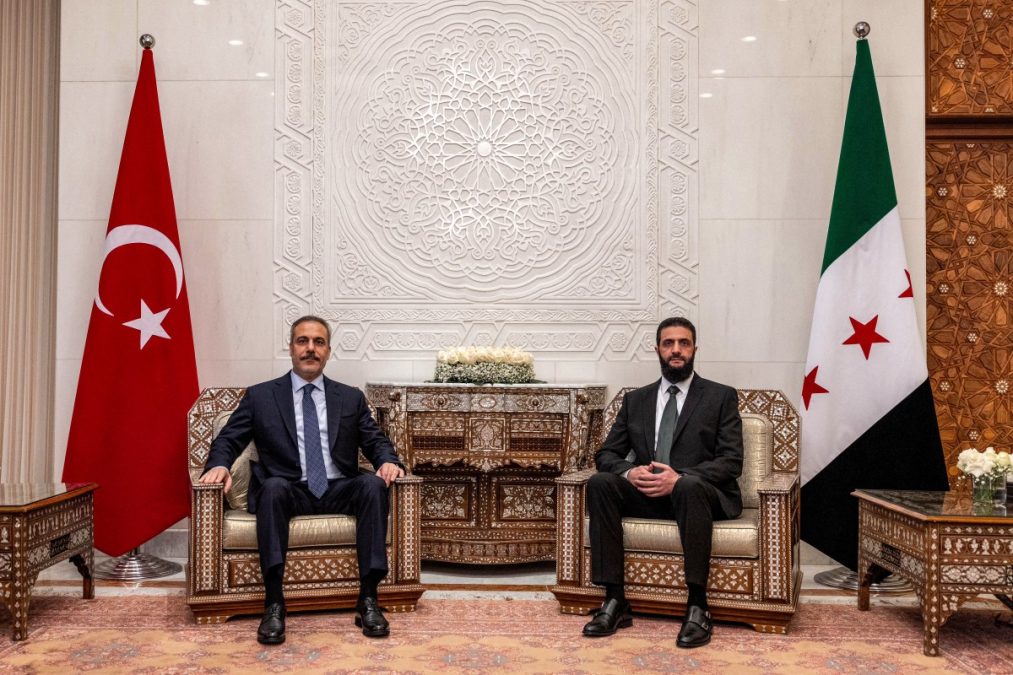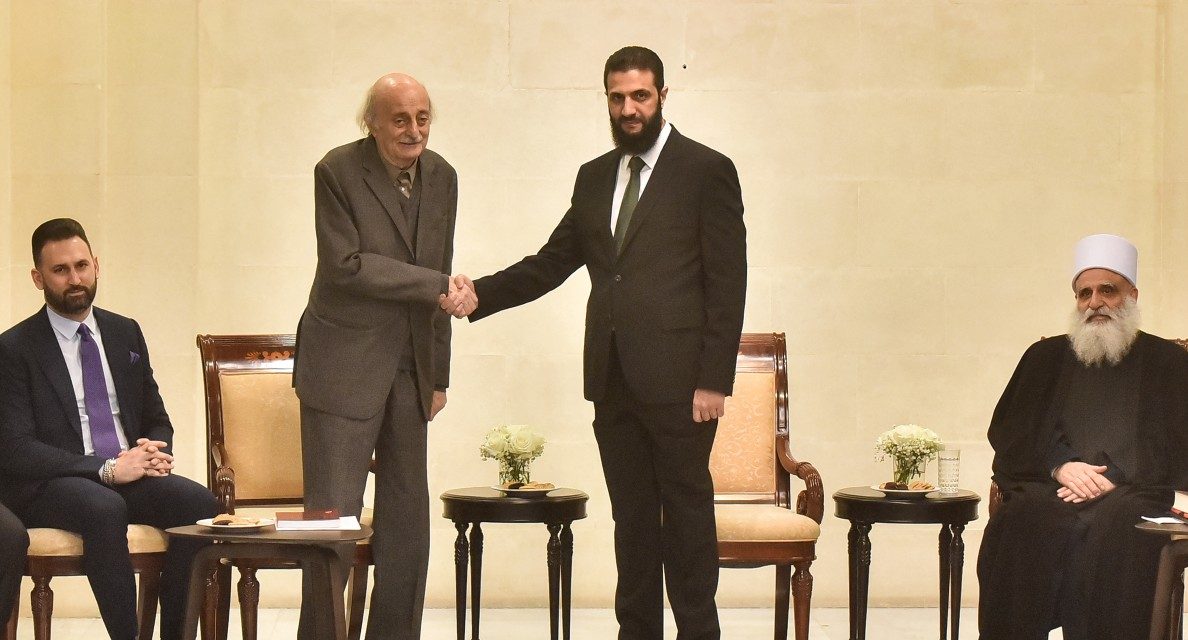Damascus, Syria – Two weeks after seizing power in a sweeping offensive, Syria’s new leader Ahmed al-Sharaa on Sunday said weapons in the country, including those held by Kurdish-led forces, would come under state control.
Sharaa spoke alongside Turkish Foreign Minister Hakan Fidan, after earlier meeting with Lebanese Druze leaders and vowing to end “negative interference” in the neighbouring country.
Ankara-backed rebels played a key role in supporting Sharaa’s Islamist group Hayat Tahrir al-Sham (HTS), which headed a rebel alliance that seized Damascus on December 8, toppling longtime ruler Bashar al-Assad.
During a press conference with Fidan, Sharaa said Syria’s armed “factions will begin to announce their dissolution and enter” the army.
“We will absolutely not allow there to be weapons in the country outside state control, whether from the revolutionary factions or the factions present in the SDF area”, he added, referring to the Kurdish-led Syrian Democratic Forces.
Sharaa traded in the olive-green military shirt he sported just days ago for a suit and tie during his meetings on Sunday at the presidential palace.
He also said “we are working on protecting sects and minorities from any attacks that occur between them” and from “external” actors exploiting the situation “to cause sectarian discord”.
“Syria is a country for all and we can coexist together,” he added.
That sentiment was on display at the colourfully-lit Christmas market in Damascus, where Batoul al-Law a dietician, said there were more Muslims than Christians.
“We have always celebrated both Christian and Muslim holidays together,” she said, but “you feel that people are now happier and more comfortable.”
Turkey’s Fidan said sanctions on Syria must “be lifted as soon as possible”. He called for the international community to “mobilise to help Syria get back on its feet and for the displaced people to return”.
Syria’s nearly 14-year civil war killed more than half a million people and displaced more than half its population, with many of them fleeing to neighbouring countries, including three million in Turkey.
Turkey has maintained strong ties with Syria’s new leaders, and has continued military operations against Kurdish-held areas in northeastern Syria.
A senior German diplomat, Tobias Tunkel, on Sunday said on X that he had spoken with SDF leader Mazloum Abdi about rising tensions in the Kurdish-held border town of Kobane “and urgent steps to diffuse them.”
The Britain-based Syrian Observatory for Human Rights said a woman and her child were killed in “artillery shelling by pro-Turkey factions” in the Kobane countryside, and the factions clashed with the SDF further south.
Ankara regards the People’s Protection Units (YPG), the main component of the SDF, as being connected to the militant Kurdistan Workers’ Party (PKK) at home, which both Turkey and Western allies deem a “terrorist” organisation.
‘Respect Lebanon’s sovereignty’ –
Regional powerhouse Saudi Arabia is also in direct contact with Syria’s new authorities, having supported the opposition to Assad for years during Syria’s civil war. Riyadh will send a delegation to the country soon, Syria’s ambassador in the Saudi capital said.
During his meeting with visiting Lebanese Druze chiefs Walid and Taymur Jumblatt, Sharaa said Syria would no longer engage in “negative interference in Lebanon at all”.

Syria “will stay at equal distance from all” in Lebanon, Sharaa added, acknowledging that Syria has been a “source of fear and anxiety” for its neighbour.
Walid Jumblatt, long a fierce critic of Assad and his father Hafez who ruled Syria before him, arrived in Damascus on Sunday at the head of a delegation of lawmakers from his parliamentary bloc and Druze religious figures.
The Druze religious minority is spread across Lebanon, Syria, Israel and Jordan.
The Syrian army entered Lebanon in 1976, only leaving in 2005 after enormous pressure and mass protests following the assassination of former prime minister Rafic Hariri, a killing attributed to Damascus and its ally, Lebanon’s Iran-backed Hezbollah group.
The seizure of power by the Sunni Islamists of HTS — proscribed as a terrorist organisation by many governments including the United States — has sparked concern, though the group has in recent years sought to moderate its image.
Global powers including the United States and the European Union have stepped up contacts with the war-ravaged country’s new leaders, urging them to guarantee protections for women and minorities.
The foreign leaders have also stressed the importance of combating “terrorism and extremism”.
Assad had long played a strategic role in Iran’s “axis of resistance”, a loose alliance of regional proxy forces aligned against Israel, particularly in facilitating the supply of weapons to Hezbollah in neighbouring Lebanon.
That axis has suffered heavy blows over the past year with Israel’s devastation of the leadership of Hezbollah in Lebanon and Hamas in Gaza.
Ayatollah Ali Khamenei, the supreme leader of Iran, on Sunday nonetheless denied that these armed groups acted as proxies, adding that: “If one day we want to take action, we do not need a proxy force.”
Netanyahu vows to act against Yemen’s Huthis
Israeli Prime Minister Benjamin Netanyahu on Sunday vowed to retaliate against Yemen’s Huthi rebels after they fired a missile at Tel Aviv, warning that Israel would target what he described as the last remaining arm of “Iran’s axis of evil”.
The Huthis struck Israel’s commercial hub on Saturday with what they claimed was a ballistic missile, injuring 16 people and forcing many to leave their homes following the pre-dawn attack.
“As we acted with force against the terrorist arms of Iran’s axis of evil, so we will act against the Huthis… with force, determination and sophistication,” Netanyahu said in a video statement.
Saturday’s strike on Tel Aviv was the second such attack on Israel by the Huthis this week, and one of several since the war in Gaza broke out.
The Iranian-backed Huthis say they are acting in solidarity with Palestinians as the war between Israel and Hamas in Gaza rages on.
The war began on October 7, 2023, following Hamas’ deadly attack on Israel.
Netanyahu’s latest comments came after the United States said it struck targets in Yemen’s rebel-held capital Sanaa on Saturday, hours after the Huthis hit Tel Aviv.
Among the targets was a Huthi missile storage centre and a “command-and-control facility,” the US Central Command (CENTCOM) said in a statement.
US forces also shot down multiple Huthi drones and an anti-ship cruise missile over the Red Sea, it said.
However, two US Navy pilots were shot down over the Red Sea early Sunday in “an apparent case of friendly fire,” the US military said.
The Huthis later claimed they had “targeted” the aircraft carrier USS Harry S Truman a day earlier in an operation that led to “shooting down an F-18 aircraft”.
‘Not alone’ against Huthis –
US and British forces have repeatedly struck rebel targets in Yemen in response to Huthi attacks on shipping in the Red Sea and Gulf of Aden, which are vital to global trade.
Israel has also previously struck the Huthis in Yemen, including hitting ports and energy facilities, after rebel attacks against its territory.
The latest Israeli strike against the Huthis was on Thursday, with Israeli warplanes striking Sanaa for the first time.
The Israeli response came soon after the rebels fired a missile that damaged an Israeli school.
On Sunday, Netanyahu acknowledged Washington’s backing, saying that Israel was “not alone” in its fight against the Huthis.
“The US, as well as other countries, see the Huthis as a threat not only to international shipping – but to the international order”, Netanyahu said in his video statement.
In a similar statement issued earlier this week, Netanyahu said the Huthis would “pay a very heavy price” for their attacks on Israel.
“After Hamas, Hezbollah and the (Bashar al-)Assad regime in Syria, the Huthis are almost the last arm of Iran’s axis of evil,” he said.
“They are finding out, and will find out, the hard way that whoever harms Israel –- will pay a very heavy price.”
As well as Hamas, Israel has fought Iran-backed groups across the region since the start of the war in Gaza, including the Huthis in Yemen and a full-blown war against Hezbollah in Lebanon.
Those campaigns have killed several leaders of Hamas and Hezbollah, including the mastermind of the October 7 attack, Hamas chief Yahya Sinwar, as well as Iranian commanders.
Israel also assassinated Hezbollah chief Hassan Nasrallah, while Sinwar’s predecessor Ismail Haniyeh was killed in a brazen attack in Tehran, which Iran and Hamas have blamed on Israel.
Israel further shocked Hezbollah with attacks involving exploding pagers and walkie-talkies that killed dozens of its fighters and wounded thousands, according to Lebanese authorities.
In late November, Israel and Hezbollah agreed to a ceasefire, which has stopped the former’s blistering bombing campaign inside Lebanon but Israeli troops are still operating in southern parts of the neighbouring country.








